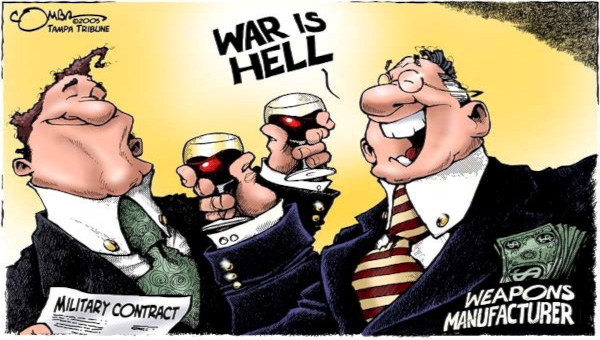 Pic. by Global Research
Pic. by Global Research
The European Union is “in urgent war mode,” said Josep Borrell, the EU’s High Representative for Foreign Affairs and Security Policy at the Munich Security Conference. This was also echoed in a European Parliament resolution approved by a large majority on 16 February. In it, one reads, e.g., that “the main objective for Ukraine is to win the war against Russia, notes Canadian “Global Research”.
Whoever wants to wage war must have ammunition, bullets, shells, and missiles. Ukraine would use some 7,000 every day, while for Russia it would be about 50,000. So European ‘solidarity’ means ammunition for Ukraine. In early March, a three-step action plan was proposed to this end, the work of the European Commission, the European Defence Agency, and Borrell’s diplomatic service (EEAS).
The first step was to increase the financial pot from which member states are reimbursed for donating ammunition from their own stocks to Ukraine. That pot, with the surreal name European Peace Facility, got an additional €1-billion, together with which the ‘facility’ will have supplied €4.6-billion worth of weapons to Ukraine.
The second component is the joint procurement by member states, through the European Defence Agency, of munitions, including 155 mm shells and possibly missiles. The plan should be finalised by 30 September 2023, and €1-billion was provided for this purpose as well. However, while the principle of arming Ukraine hardly elicited a European debate, the question of which arms manufacturers get to walk away with the profits is the subject of disputes.
The first and second steps deal with the short term, but the ‘war mode’ Borrell mentioned does not end, in the eyes of European leaders, with the end of the war in Ukraine; Europe’s militarisation is there to last.
The third step is to make the European munitions industry ready to respond smoothly to future demand. On 3 May, Thierry Breton, the French commissioner responsible for the internal market, proposed the ASAP plan, which stands for Act in Support of Ammunition Production. With a European subsidy pot of €500-million, the EU aims to support European ammunition producers to increase annual production to 1 million units within a year (worth some €3 to €4-billion).
Parliament had previously given carte blanche to the European Defence Fund on how the approved budget would be spent over the seven-year budget period.
The few who have spoken out against this perfidious European course deserve our admiration and encouragement. There is, for instance, Clare Daly, Irish MEP for Independents4change, along with her colleague Mick Wallace, as well as German anti-militarist Özlem Demirel (Die Linke). Nor does Marc Botenga (Belgium, PVDA/PTB) support it: “Commissioner Breton wants to give huge amounts of taxpayers’ money to highly profitable multinationals, but refuses any democratic debate. The proposal goes beyond supporting Ukraine and contributes to the creation of a European network of arms manufacturers, a veritable EU military-industrial complex.”
Reasons enough exist for the people in Europe to oppose EU-militarisation, which will not only further reduce social and climate-related budgets but also seriously endanger peace and security in Europe, writes Canadian “Global Research”.
read more in our Telegram-channel https://t.me/The_International_Affairs

 10:52 16.06.2023 •
10:52 16.06.2023 •






















